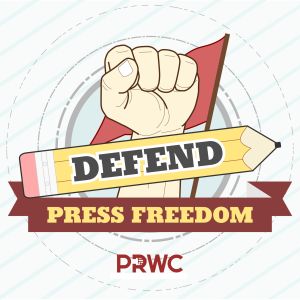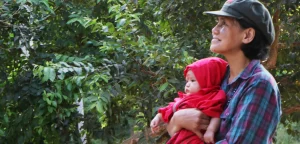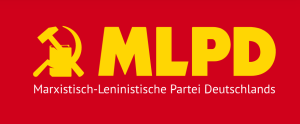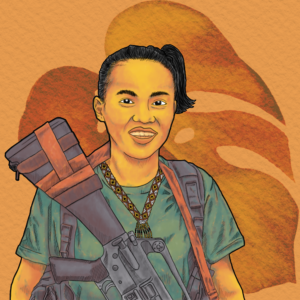On the Communist Party of the Philippines, the armed revolution and the Duterte regime

The solution to the basic problems that generate extreme inequalities in the Philippines is not yet socialism or communism. The current basic problems of foreign monopoly capitalism, domestic feudalism and bureaucrat capitalism should not be glossed over but should be confronted and solved immediately.”
Questions from Federico Miguel Segarra, Agencia EFE
Answers by Prof. Jose Maria Sison (JMS),
Founding Chairman, Communist Party of the Philippines
1. Why did you decide to create the new Communist Party in the Philippines (CPP), and why did you decide to break with old PKP?
JMS: My comrades and I decided to found the Communist Party of the Philippines on December 26, 1968 under the guidance of Marxism-Leninism-Maoism. We decided to break from the old PKP because of its revisionist line of indefinite legal struggle in the face of the chronic crisis of the semicolonial and semifeudal ruling system and because the old PKP sided with the revisionist CPSU on fundamental questions regarding the theory and practice of Marxism-Leninism.
2. Knowing that the proletarian revolutionary movements only survive in Nepal, India and the Philippines, why does the NPA still criticizes the socialist revisionism and still embraces Maoism?
JMS: The era of modern imperialism and the world proletarian revolution is not yet finished. The epochal struggle between the monopoly bourgeoisie and the proletariat is still continuing despite the setbacks caused by the betrayal of socialism by modern revisionism in the Soviet Union since 1956 and in China since 1976.
All the basic contradictions in the world capitalist system are intensifying: between capital and labor in the imperialist countries, between the imperialist countries and the oppressed peoples and nations and among the imperialist powers themselves. The contradictions of US and Chinese imperialism have taken the center of the stage in the world capitalist system.
The concatenation of anti-communism, neocolonialism, neoliberalism, state terrorism and endless US wars of aggression have proven to be bankrupt. Thus, there have been unprecedented upsurges of anti-imperialist and democratic mass struggles on a global scale since the financial meltdown of 2008. These are the prelude to the resurgence of the world proletarian revolution.
The revolutionary movements led by the Maoist parties in Nepal, India and the Philippines are the torch-bearers in the transition to the resurgence of the world proletarian revolution. The addition of the new imperialist powers, China and Russia, to the ranks of the traditional imperialist powers like the US, UK, Western Europe and Japan is rapidly worsening the crisis of the world capitalist system.
3. Until what extent did the NPA and the CPP played an important role in destabilizing Marcos regime?
JMS: The people’s democratic revolution through protracted people’s war advanced rapidly nationwide in the Philippines after Marcos declared martial law in 1972 and imposed fascist dictatorship on the Filipino people. The armed revolution undermined and unsettled the fascist regime with the growth of the CPP, NPA, the underground revolutionary mass organizations, the National Democratic Front of the Philippines and the local organs of democratic power which constituted the people’s revolutionary government.
The armed revolution became stronger because Marcos’ policies of mass murder and plunder aggravated the crisis of the ruling system and then he had his intra-systemic arch rival Aquino assassinated in 1983. The CPP directed the NPA to intensify the armed struggle nationwide and encouraged the legal patriotic and progressive organizations to cooperate with the much-weakened conservative opposition in carrying out gigantic mass protest actions in Metro Manila and in the entire country until the 1986 overthrow of Marcos.
After the assassination of Aquino, the US decided to junk Marcos and then baited him into declaring the presidential snap election of 1986 in order to lay the ground for his ouster for electoral fraud. What finished Marcos was the anti-Marcos convergence of the US, the Catholic Church, most of the oligarchy, the conservative opposition, the rapid growth of anti-Marcos groups within the reactionary armed forces and the organized masses of the legal patriotic and democratic forces. The CPP encouraged the broad masses of the people to rise up.
The organized masses of the legal patriotic and democratic forces constituted more than 80 per cent of the masses encircling the presidential palace and the hard core 20 per cent of the masses at Edsa where most of the people gathered in response to the call of Cardinal Sin of the Catholic Church to support the defense secretary and constabulary chief who had turned against Marcos. It was a broad united front of the masses of workers and peasants, the middle social strata and anti-Marcos conservative sections of the ruling system that isolated and finished off Marcos.
4. Do you believe Duterte´s aggressive populist strategy is popular among Filipinos due to the extreme inequalities that still affect the country? In other words, do you believe accepting such an extreme political position is the result of a total failure of an unfair economic system, which also explains the support that the NPA still has in the rural areas?
JMS: Such adjectives as “populist” and “popular” to describe Duterte are euphemistic and misleading. We ought to describe Duterte as demagogic and notorious. These are the precise terms. In the eyes of the broad masses of the people, Duterte is already totally exposed as a traitor, tyrant, mass murderer, plunderer and swindler.
As traitor, he has allowed China to build artificial islands and military bases in the West Philippine Sea in violation of the UNCLOS and the sovereign and maritime rights of the Filipino people. As tyrant, he has used the military, police and death squads to terrorize the legal opposition and the people. As mass murderer, he has killed extrajudicially 34,000 people in the bogus war on drugs as well as thousands of workers, peasants, indigenous people, women, youth, social activists, human rights defenders and peace advocates in the armed counterrevolution.
As plunderer, he has stolen hundreds of billions of pesos through the pork barrel system, the unaudited funds for intelligence, overpriced purchases of military equipment, fake military operations, fake NPA mass surrenders, the smuggling out of mineral ores and smuggling in of illegal drugs, rice and other commodities, payments to dummy corporations for overpriced or nonexistent medical supplies in the name of fighting the Covid-19 pandemic and the nondelivery and theft of the promised economic assistance to those who have lost their jobs and means of livelihood during the pandemic.
As a political swindler, he called himself the first Left and socialist politician to become president of the Philippines in 2016. As soon as he assumed the presidency, he issued secret orders to his military to start an all-out war against the revolutionary movement. He terminated the GRP-NDFP peace negotiations in 2017 and designated the CPP and NPA as terrorists and equated communism with terrorism. In 2018 he formed a national task force to engage in state terrorism. And in 2020 he took advantage of the pandemic to railroad a law for furthering the rampage of state terrorism on the pretext of anti-terrorism.
Duterte has aggravated the economic, social and political crisis of the ruling system by pursuing the policies of neoliberalism and state terrorism, by wasting resources through bureaucratic corruption and military overspending, by smuggling out mineral ores without documentation and taxation, by smuggling in illegal drugs, rice and all sorts of commodities. Duterte has bankrupted the Philippine economy and his own government. Thus, the revolutionary movement is becoming stronger than ever before because the Filipino people want revolutionary change.
5. Given that the brutal war on drugs affects mainly the poor urban areas, do you believe Duterte´s brutal war on drugs is the epitome of the unfairness of the socioeconomic system in the Philippines?
JMS: The brutal war on drugs victimizing the urban poor and carried out under public incitation of the police by Duterte has three purposes. First, it has been used by Duterte to make himself the supreme drug lord and his own crime family supreme in collaboration with Chinese criminal triads. Second, Duterte has used the war on drugs to corrupt and make military and police officers his criminal accomplices in the illegal drug trade. And third, he has used the war on drugs to evoke the image of a strong man capable of killing people and his political opponents with impunity. He is cowardly because he chooses as target of mass murder poor people whom he estimates are incapable of fighting back legally or otherwise.
Also in the armed counterrevolution, he is killing more workers and peasants than those who belong to the middle social strata. You are correct that the mass killing of the poor in his bogus war on drugs takes advantage of the unfairness and injustice of the socioeconomic system in the Philippines. The tens of thousands of victims do not have the means to fight back legally or otherwise and even if some of them can be assisted by human rights defenders and religious organizations these are frustrated by extralegal or illegal obstacles put up by Duterte’s military and police agents. Thus it is necessary for the International Criminal Court to come into play and hold Duterte and his minions accountable.
6. What is your summary of Duterte´s record during these 5 years? Has it really fought the economic elite as he still claims?
JMS: I have already described the shameless and ignominious record of Duterte as a traitor, tyrant, mass murderer, plunderer and political swindler and I have already explained every major criminal role that he has played against the national and democratic rights of the Filipino people.
Duterte has not fought against the economic elite but he has sought to preserve the entire exploitative ruling system of big compradors, landlords and bureaucrat capitalists who are servile to foreign monopoly capitalism and at the same time he favors his own narrow clique of oligarchs and cronies among the Filipino and Chinese businessmen with whom he has collaborated since his years of being Davao City mayor..
Duterte has long been a corrupt politician acting as the agent of the foreign and local corporations with mining, logging and plantation operations in Mindanao. As president, he has been able to accumulate his private wealth by stealing public funds, cutting into private business contracts, taking over businesses of his opponents and engaging in the illegal drug trade and other criminal activities. Duterte is like Ferdinand Marcos and idolizes him.
7. What could be attitude of Bong Bong Marcos towards the CPP and the NPA if he achieves power?
JMS: If he achieves taking presidential power, Bong Bong will certainly fight and try to destroy the CPP and NPA just like his father had tried to do in vain.
8. What are the recipes that you give for tackling the extreme inequalities that still affect your country?
JMS: The solution to the basic problems that generate extreme inequalities in the Philippines is not yet socialism or communism. The current basic problems of foreign monopoly capitalism, domestic feudalism and bureaucrat capitalism should not be glossed over but should be confronted and solved immediately.
The country is still semicolonial and semifeudal and must advance through the people’s democratic revolution. We must achieve full national independence, people’s democracy, social justice, economic development through genuine land reform and national industrialization, improvement of wage and living conditions, expansion of social services, promotion of a national, scientific and mass culture and independent foreign policy of international solidarity with all peoples and countries of the world. ###




